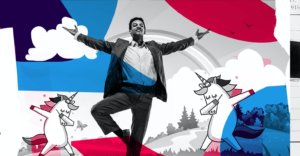You can use the behavioral event interview technique for this.

We know from various researches or experiences that people who can understand and manage their own and others’ emotions are better leaders. These leaders can cope with stress, overcome obstacles and inspire others to work towards collective goals. They manage conflict with fewer accidents and can build stronger teams. And they’re usually happier at work, too. But many managers lack fundamental self-awareness and social skills. They fail to notice the influence of their own emotions and moods. In today’s fast-paced world, they may be less adaptable than they should be.

And they lack basic empathy for others: They don’t understand people’s needs, which means they can’t meet those needs or inspire people to take action.
One of the reasons we see people with very little emotional intelligence in the workplace is that we don’t hire people based on that. We hire people with high IQs , with references to the schools they attend, their high grades and test scores, their technical skills and certifications, or whether they build great teams, how they work well with others, and also how smart we think they are.
Of course, we need smart, experienced people in our companies, but we also need more people who are adept at dealing with change, understanding and motivating others, and managing both positive and negative emotions to create an environment where everyone can be at their best. The problem is that we have a hard time assessing emotional intelligence (EQ) when hiring (even if we spend a fortune on personality tests and various consulting firms) and we never learn how to do that. But you can actually recruit based on emotional intelligence, which doesn’t need to cost an arm and a leg. You can start with these dos and don’ts if you want to get started.
Do not:
– Use personality tests like power of attorney for emotional intelligence. Most of these tests try to measure what they say they do: namely, their personality. They do not measure specific emotional intelligence competencies such as self-awareness, positive outlook, achievement orientation, empathy, or inspirational leadership.
– Use self-report tests. There are two reasons why these don’t work. First, if a person is unaware of himself, how can he evaluate his own emotional intelligence? If he’s self-aware and knows what he’s missing, will he really tell the truth while trying to get a job?
– Use a 360-degree feedback tool, even if it is valid, and measures Emotional Intelligence competencies such as the Emotional and Social Competence Inventory (ESCI). A tool like 360-degree feedback should be used for development, not evaluation. When these tools are used for assessment, people play by choosing them carefully and even preparing them for how they will score.
Do the following:
– Get their references and talk to them. Reference letters aren’t good enough to understand your candidate’s emotional intelligence. When you actually talk to a reference, you can ask specific and definitive questions about how the candidate demonstrates various emotional intelligence competencies. Get lots of examples with lots of details. Specifically, ask for examples of how your candidate treats other people.
– Interview on determining his emotional intelligence. This sounds easy, and many people may think they’ve already done it. But most of the time, this is not true. This is because we don’t allow people to be vague in their answers and ask good follow-up questions. Even when we ask candidates directly about EQ or EQ-related competencies, they talk about an idealized concept and what they want to be, rather than how they actually act. You can use the behavioral event interview to overcome this barrier.
The behavioral event interview is a powerful way to learn about candidates’ competencies and see how they demonstrate these competencies.
Here is what you will do:
Begin the interview by making the candidate as comfortable as possible. The goal here is to make the candidate feel chatty, informal, and warm during the interview. This tone will help you understand the truth. Then ask a few traditional questions about the person’s background and experiences.
You are now ready to begin the behavioral event portion of the interview. Ask the person to think about a current and work situation that involves a complex problem that they and others need to resolve. Encourage your candidate to choose an event where he is the “hero”. And ask him to choose a situation that ultimately succeeds, causing him to be proud. Encourage him to tell the story briefly at first. Then go over the whole story and ask specific questions about what he thinks, feels, and does from start to finish.
Now, ask him to tell you a story about a failed situation that feels like a failure, and your candidate learned something from it. Again, ask for a brief overview and then go into a lot of detail.
Finally, if you want to make your candidate feel good about yourself and the interview, look for another positive, successful story from your life.
This interview technique allows you to ask and hear details about how the candidate thinks in situations involving stress, difficulties, and about other people. You also get information about how they felt during these events. At the very least, it shows you whether the person is aware of their own feelings. You’re also likely to hear about how the person manages these emotions and how aware they are of their impact on others. And more importantly, it allows the person to tell you what they really did and how they acted. In this way, you can see your emotional intelligence more clearly.
The behavioral case interview technique is not a magic wand and it takes practice to get enough detail in every story. Don’t worry about asking the person to review parts of the story once or twice. Instead, try to get them to tell the story from several perspectives; that is, find out what he thinks, how he feels, and what he actually does afterwards. Take your time: This is not the kind of interview you can do in half an hour.
If you can “see” how your candidate can use his or her emotional intelligence while working, you will have a better hiring. Or you will continue with another candidate. Either way, you’ll be doing yourself and your organization a huge favor.
Annie McKee | HBR
Annie McKee is a senior fellow at the University of Pennsylvania Institute of Education and the director of PennCLO Executive Doctoral Program. She is the author of the book ” How to Be Happy at Work ” and is also a co-author of the books ” Primal Leadership “,” Resonant Leadership ” and ” Becoming a Resonant Leader “.











